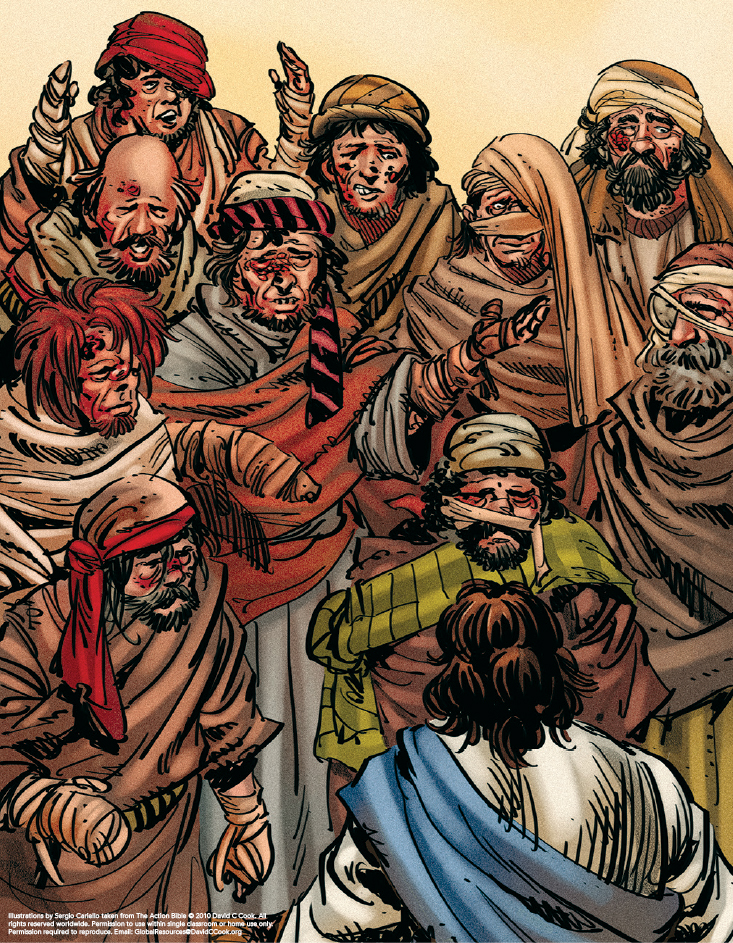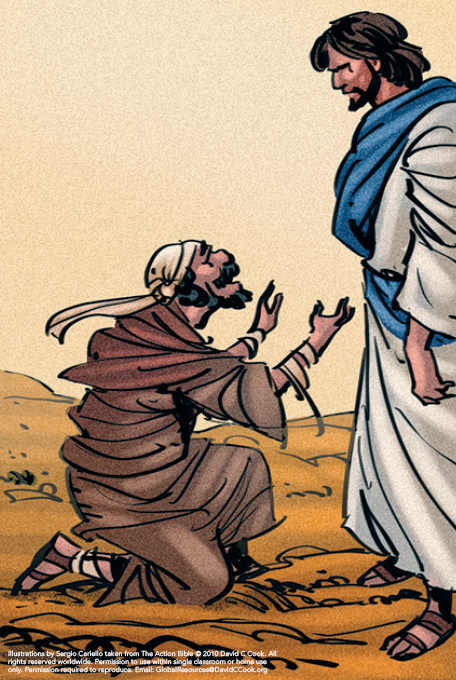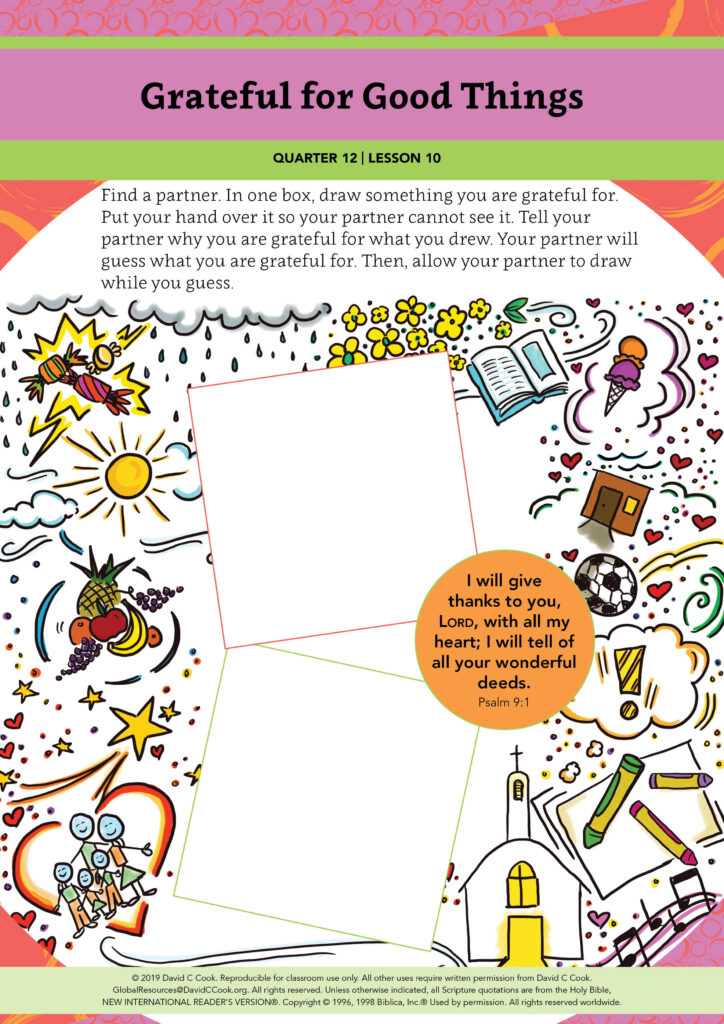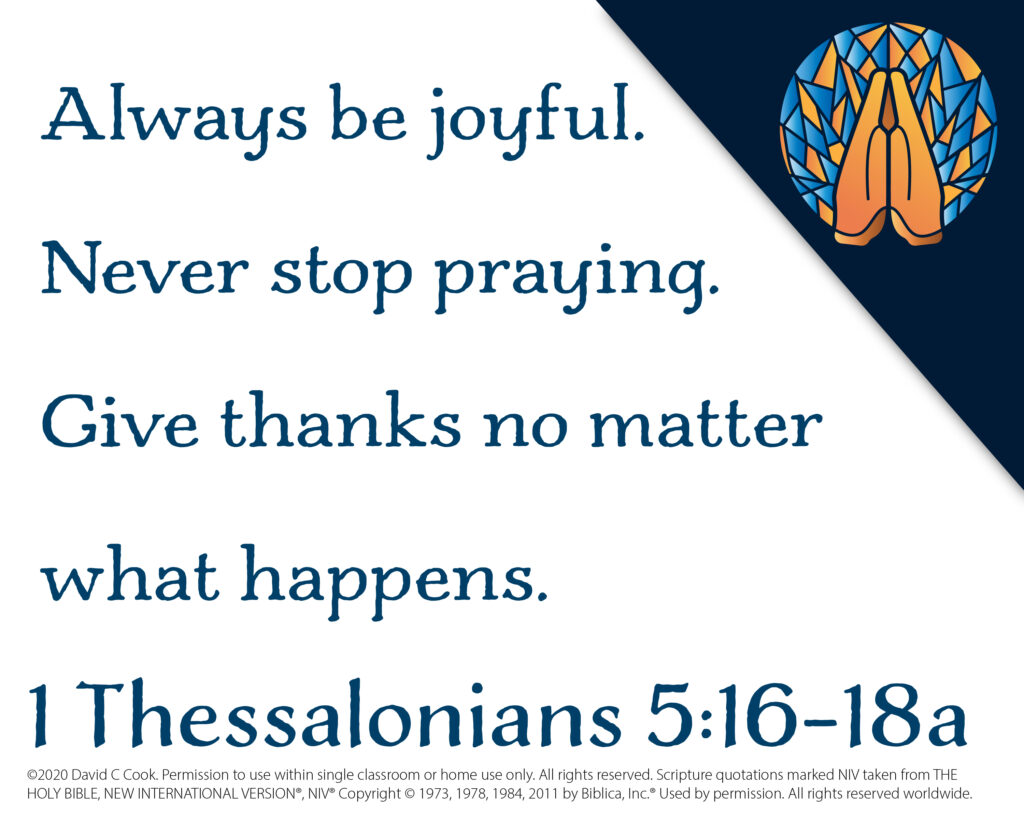During the lesson, the information for you to know is written in regular type, and what we suggest speaking or reading aloud to children is in bold. All resources for this lesson, including the Teacher Guide, Student Page, Family Connection Card, and other resources can be downloaded in a ZIP file by clicking on the following link:
In some lessons you will find "resource articles." These are articles written by experts from around the world to help equip you for your work with children and adolescents. Share them with parents or guardians if you consider it appropriate.
I will give thanks to you, Lord, with all my heart; I will tell of all your wonderful deeds.
Psalm 9:1
God gives us many good things to be grateful for. He provides for our spiritual needs by offering us love and forgiveness. He also provides for our physical and emotional needs by giving us shelter, food, and community. God does so many wonderful things we can thank Him for!
Take a moment to think of the good things God has done in your life or in the lives of others. Maybe He provided food for your family when there was not enough to eat. Maybe He healed a relative from an illness. As you go through this week, pause each day to thank Him for a good thing He has done. Remember, He is a God of wonderful deeds!
Encourage families to talk about the good things in their lives as they go through the week. Suggest that they find ways to show their gratefulness to God and to others.
Teacher Tip: If possible, email or text the Family Connection Card to the families of your students.
Welcome the children to class and ask them to sit in pairs. Ask them to share with their partners what it means to be grateful.
Today we will learn how to find good things to be grateful for. Being grateful means we are thankful for what God has given us, like our family members or the food we have to eat.
Let’s do an activity to look for things we can be grateful for. We will pretend we are detectives. A detective looks for clues to help him solve a mystery. To help us solve the mystery of what it means to be grateful, we will look for clues in the situation I share with you. As detectives, you need to listen very carefully! Each time I say something you can be grateful for in this situation, put up 1 finger. We will see how many things you can find to be grateful for.
Situation: You wake up and greet your family. Together, you prepare a meal to eat. As you eat, you taste the sweetness of the bread and fruit. Someone in your family tells you something funny, and you laugh a lot. As you leave the house, you feel the warm sunshine on your face. You know it will be a good day.
What is something you see that you can be grateful for?
Pause for about 30 seconds to allow the children to respond with their partners. Then, ask 1–2 children to answer the question for the whole class.
In this situation, I can see my family, the food, and the sunshine. I will read the situation again. Then I will ask you some questions about what you hear, taste, and feel. Listen carefully, detectives!
Situation: You wake up and greet your family. Together, you prepare a meal to eat. As you eat, you taste the sweetness of the bread and fruit. Someone in your family tells you something funny, and you laugh a lot. As you leave the house, you feel the warm sunshine on your face. You know it will be a good day.
Pause for about 30 seconds after each question to allow the children to respond with their partners. As they respond, you may walk around the space and reread the situation if any pairs are not able to answer a question.
Have the children sit with their partners for the lesson.
Great job, detectives! You found many things to be grateful for! Asking questions can help us recognize good things in our lives to be grateful for. We will learn more about that today.
Today we will practice finding things to be grateful for. There are many good things God does in our lives. Sometimes these good things are done by people in our lives, and sometimes they just happen. When we show we are grateful for good things, it can help us to be happier, calmer, and more hopeful!
The Bible tells a true story about a man who was grateful for a good thing Jesus did. As I read this story, listen for good things that happen. When something good happens in the story, we will say, “Wow, that is a good thing from God!” Let’s practice. I will say, something good, such as, “Jesus came to help the man.” You will say, “Wow, that is a good thing from God!”
Use the statements below or create your own. Pause after each statement and encourage the children to say, “Wow, that is a good thing from God!”
Now you are ready to respond to the good things you hear in our story. Remember to respond, “Wow, that is a good thing from God!”
Optional: If possible, share the images from The Action Bible.


Jesus was on His way to Jerusalem when a group of 10 men came up to Him. The men had a painful skin disease, and they knew Jesus could heal people and do miracles.
Encourage the children to respond, “Wow, that is a good thing from God!”
Listen to what the men said to Jesus.
If possible, read this verse directly from your Bible.
And they called out in a loud voice, “Jesus! Master! Have pity on us!”
Luke 17:13
These men wanted Jesus to help them. They were not allowed to enter the nearby village because their skin disease may have made others sick. Do you know what Jesus did? Jesus healed the 10 men of their skin disease!
Encourage the children to respond, “Wow, that is a good thing from God!”
That is a good thing! After that good thing happened, 9 of the men went back to their village. But, 1 man did something different.
What do you think this man did? Turn to your partner and share your answer.
Give the children about 1 minute to respond.
Listen to what this man did.
When one of them saw that he was healed, he came back. He praised God in a loud voice. He threw himself at Jesus’ feet and thanked him. The man was a Samaritan.
Luke 17:15–16
What did this man do that was different from the other 9 men? Turn to your partner and share your answer.
Possible answers include: He praised God. He thanked Jesus.
This man noticed he was not sick anymore. He could have left Jesus without saying anything just as the other men did. Instead, he chose to praise God and thank Jesus for healing him. The man showed Jesus that he was grateful.
Encourage the children to respond, “Wow, that is a good thing from God!”
Just as the men in our story had something good happen to them, we all have things to be grateful for in our lives, too. Sometimes they are very easy to see, such as feeling better after being sick. At other times, the good things are more difficult to see, such as having someone to take care of you when your parents are away.
This verse from the book of Psalms talks about what we can do to show we are grateful for good things. Listen carefully to what it says.
I will give thanks to you, Lord, with all my heart; I will tell of all your wonderful deeds.
Psalm 9:1
What does this verse tell us we can do when we are grateful?
Allow 1–2 children to respond.
What are some examples of good things in your life? Turn to your partner and share your answer.
Give the children about 1 minute to respond.
What could you do to show you are grateful for a good thing in your life? Turn to your partner and share your answer.
Give the children about 1 minute to respond. Possible answers include: pray and thank God for what He has provided, focus on the good things, and encourage others.
We all have many things in our lives to be grateful for, and it is important for us to notice them and to show others that we are grateful.
Let’s do something fun to help us remember to be grateful for all of the good things in our lives. Take a minute to look at the things and people around you. Find people who help you and things that you need or that make you happy. Then think about why you are grateful for the things and people you see.
Allow 1 minute for the children to look for good things and people.
Optional: If you are using Student Pages, give the children crayons and allow 1–2 minutes for them to draw something they are grateful for. They may then use this page to play the game that follows.

In a moment, you will give your partner a clue about what you are grateful for. Allow me to use my bird example. I would give my partner a clue such as: The thing I am grateful for sings, or the thing I am grateful for makes beautiful music.
There are many things to be grateful for. When we talk with other people about what we are grateful for, it helps us to focus on good things instead of on our worries or sadness. Our memory verse today reminds us to be grateful at all times.
If you are using the Memory Verse Poster, show it to the students.
Always be joyful. Never stop praying. Give thanks no matter what happens.
1 Thessalonians 5:16–18a

Use the rhythm you created in Lesson 9 for the memory verse as you say this verse. Then, encourage the children to say the words and clap the rhythm with you 3 times.
End class by saying this blessing, based on 1 Thessalonians 5:18, over the children.
Blessing: May you give thanks always, no matter what happens. May you live with a grateful heart!
Lead the children in singing this quarter’s song, if possible.
Life on Life ©2020 David C Cook. Reproducible for home or classroom use only. All other uses require written permission from David C Cook [email protected]. All rights reserved.